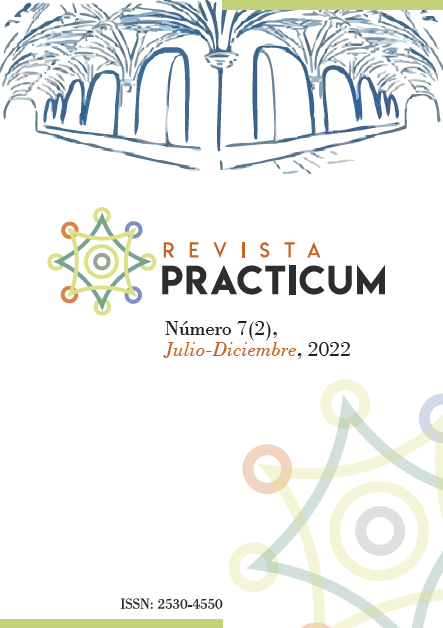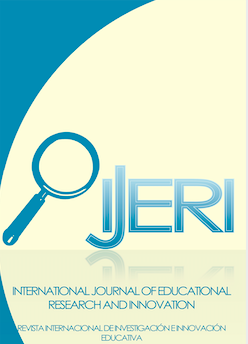La reflexión sobre la práctica preprofesional en la formación de aprendices de docente. Percepciones de los tutores académicos
DOI:
https://doi.org/10.24310/RevPracticumrep.v7i2.13878Palabras clave:
Práctica preprofesional, formación del profesorado, pareja pedagógica, reflexión conjunta, relación teoría-practicaResumen
La formación de los aprendices de docente (AdD) en la actualidad demanda modelos de formación orientados a fortalecer la relación teoría-práctica y la reflexión sobre las situaciones o experiencias de la práctica preprofesional (PP). La presente investigación se desarrolló en la Universidad Nacional de Educación (UNAE). Comportó tres estudios de caso múltiple de los correspondientes grupos de AdD de quinto semestre de la carrera de Educación Básica (EB) en la Universidad Nacional de Educación en Ecuador y sus correspondientes parejas pedagógicas académicas de tutores (PPA), quienes participaron en un proceso de reflexión conjunta. Se llevaron a cabo dos entrevistas semiestructuradas en profundidad que fueron analizadas mediante un estudio temático deductivo. Los resultados identifican las diferencias en las representaciones sobre la naturaleza de reflexión que enseñan entre los tutores que componen las PPA y subrayan la necesidad de formarles para una enseñanza de la reflexión más colaborativa.
Descargas
Métricas
Publicación Facts
Perfil de revisores N/D
Información adicional autores
Indexado: {$indexList}
-
Indexado en
- Sociedad Académica/Grupo
- N/D
- Editora:
- Universidad de Málaga
Citas
ARMIF, (2014) La reflexión conjunta en las prácticas como mecanismo de vinculación entre la universidad y la escuela. Referencia: 2014ARMIF0052
Braun, V. y Clarke, V. (2006). Using thematic analysis in psychology. Qualitative Research in Psychology, 3(2), 77–101. https://www.tandfonline.com/doi/abs/10.1191/1478088706qp063oa
Brenner, M. (2006). Interviewing in Educational Research. En J. Green, G. Camilli, y P. Elmore (Eds.), Handbook of Complementary Methods in Education Research (pp. 357-369). Lawrence Erlbaum Associates.
Clarà, M. (2014). What Is Reflection? Looking for clarity in an ambiguous notion. Journal of Teacher Education, 66(3), 261-271. https://doi.org/10.1177/0022487114552028
Clarà, M., Mauri, T., Colomina, R. y Onrubia, J. (2019). Supporting collaborative reflection in teacher education: a case study. European Journal of Teacher Education, 42(2), 175–191. https://doi.org/10.1080/02619768.2019.1576626
Clarà, M. y Mauri, T. (2010). El conocimiento práctico. Cuatro conceptualizaciones constructivistas de las relaciones entre conocimiento teórico y práctica educativa. Infancia y Aprendizaje, 33(2), 131-141. https://doi.org/10.1174/021037010791114625
Colén, M, T. y Castro, L., (2017). El desarrollo de la relación teoría y práctica en el grado de maestro en educación primaria. Profesorado. Revista de currículum y formación de profesorado, 21, 59-79. https://recyt.fecyt.es/index.php/profesorado/article/view/58048
Coll, C. (1999). La concepción constructivista como instrumento para el análisis de las prácticas educativas escolares. En C. Coll, C. Gotzens Busquets, y ICE-HORSORI (Eds.), Psicología de la instrucción: la enseñanza y el aprendizaje en la educación secundaria (pp. 16-44).
Coll, C. (2001). Lenguaje actividad y discurso en el aula. En Desarrollo Psicológico y Educación Vol. 2. Psicología de la Educación Escolar (pp. 387-413).
Corbin, J. M. y Strauss, A. (2015). Basics of Qualitative Research: Techniques and Procedures for Developing Grounded Theory. SAGE Publications Inc.
Crasborn, F., Hennissen, P., Brouwer, N., Korthagen, F. y Bergen, T. (2011). Exploring a two-dimensionals model of mentor teacher roles in mentoring dialogues. Teaching and Teacher Education, 27, 320–331. https://doi.org/10.1016/j.tate.2010.08.014
Daniel, G., Auhl, G. y Hastings, W. (2013). Collaborative Feedback and Reflection for Professional Growth: Preparing First-Year Pre-Service Teachers for Participation in the Community of Practice. Asia-Pacific Journal of Teacher Education, núm. 2, pp. 159-172. https://doi.org/10.1080/1359866X.2013.777025
Darling-Hammond, L. (2006). Powerful teacher education: Lessons from exemplary programs. Jossey-Bass.
Darling-Hammond, L. (2017) Teacher education around the world: What can we learn from international practice?, European Journal of Teacher Education, 40(3), 291-309.
https://doi.org/10.1080/02619768.2017.1315399
Dewey, J. (1933). How we think. In J. A. Boydston (Ed.), The Later Works of John Dewey, Volumen 8:1933. Carbondale y Edwardsville: Southern Illinois University Press.
Dewey, J. (1938). Logic: The Theory of Inquiry. Henry Holt & Company.
Dewey, J. (1989). Como pensamos: nueva exposición de la relacio?n entre pensamiento y proceso educativo. Paido?s.
Erickson, F. (1985). Qualitative methods in research on teaching. Handbook of research on teaching – A project of the American research association, 119-161. http://eric.ed.gov/?id=ED263203
Evertson, C. y Green, J. (1989). La observación como indagación y como método. En M. Wittrok (Ed.), La investigación de la enseñanza II. Métodos cualitativos y de observación (pp. 303-421). Paido?s-MEC.
Foong, L. Y. Y., Nor, M. B. M. y Nolan, A. (2018). The influence of practicum supervisors’ facilitation styles on student teachers’ reflective thinking during collective reflection. Reflective Practice, 19(2), 225–242. https://doi.org/10.1080/14623943.2018.1437406
Gelfuso, A. (2016). A framework for facilitating video-mediated reflection: Supporting preservice teachers as they create “warranted assertabilities” about literacy teaching and learning. Teaching and Teacher Education, vol. 58, pp. 68-79. https://doi.org/10.1016/j.tate.2016.04.003
Gelfuso, A. (2017). Facilitating the development of preservice teachers’ Pedagogical Content Knowledge of literacy and agentic identities: Examining a teacher Educator’s intentional language choices during video-mediated reflection. Teaching and Teacher Education, 66, 33–46. https://doi.org/10.1016/j.tate.2017.03.012
Gelfuso, A. y Dennis, D. V. (2014). Getting reflection off the page: The challenges of developing support structures for pre-service teacher reflection. Teaching and Teacher Education, 38, 1-11. https://doi.org/10.1016/j.tate.2013.10.012
Haneda, M., Sherman, B., Nebus Bose, F. y Teemant, A. (2019). Ways of interacting: What underlies instructional coaches’ discursive actions. Teaching and Teacher Education, 78, 165-173. https://doi.org/10.1016/j.tate.2018.11.017
Harford, J. y MacRuairc, G. (2008). Engaging student teachers in meaningful reflective practice. Teaching and Teacher Education, 24(7), 1884–1892. https://doi.org/10.1016/j.tate.2008.02.010
Jones, L., Tones, S., Foulkes, G. y Jones, R. C. (2021). Associate Teachers’ views on dialogic mentoring. Teachers and Teaching: Theory and Practice, 27(1–4), 181–192. https://doi.org/10.1080/13540602.2021.1933421
Korhonen, H., Heikkinen, H. L. T., Kiviniemi, U. y Tynjälä, P. (2017). Student teachers’ experiences of participating in mixed peer mentoring groups of in-service and pre-service teachers in Finland. Teaching and Teacher Education, 61, 153–163. https://doi.org/10.1016/j.tate.2016.10.011
Korthagen, F. y Vasalos, A. (2005). Levels in reflection: Core reflection as a means to enhance professional development. Teachers and Teaching: Theory and Practice, 11(1), 47-71. https://doi.org/10.1080/1354060042000337093
Korthagen, F. y Lagerwerf, B. (2001). Teachers' professional learning: how does it work? In F. Korthagen, J. Kessels, B. Koster, B. Lagerwerf, y T. Wubbels (Eds.), Linking practice and theory: The pedagogy of realistic teacher education (pp. 175-206). Lawrence Erlbaum Associates.
Liu, K. (2017). Creating a dialogic space for prospective teacher critical reflection and transformative learning. Reflective Practice, 18, 805–820. https://doi.org/10.1080/14623943.2017.1361919
Liu, K. y Ball, A. F. (2019). Critical reflection and generativity: Toward a framework of transformative teacher education for diverse learners. Review of Research in Education, 43(1), 68–105. https://doi.org/10.3102/0091732X18822806
Mauri, T., Clarà, M., Colomina, R. y Onrubia, J. (2015). Naturaleza de la interacción en procesos de reflexión conjunta sobre situaciones de la práctica por estudiantes de maestro. Papeles de Trabajo Sobre Cultura, Educación y Desarrollo Humano, 11(2), 105–109. http://www.uam.es/otros/ptcedh/2015v11_pdf/v11n2sp.pdf
Mauri, T., Clarà, M., Colomina, R. y Onrubia, J. (2016). Educational assistance to improve reflective practice among student teachers. Electronic Journal of Research in Educational Psychology, 14(39), 287-309. http://dx.doi.org/10.14204/ejrep.39.15070
Mauri, T., Clarà, M., Colomina, R. y Onrubia, J. (2017). Patterns of interaction in the processes of joint reflection by student teachers. Journal of Education for Teaching, 43(4), 427-443. https://doi.org/10.1080/02607476.2017.1296542
Mauri, T., Onrubia, J. y Colomina, R. (ed.) (2021). Mejorar las prácticas de maestro: pautas e instrumentos. Un modelo basado en la colaboración y la reflexión conjunta entre escuela y universidad. Pautas e instrumentos. Grijalbo
Mauri, T., Onrubia, J. Colomina, R. y Clarà, M. (2019). Sharing initial teacher education between school and university: participants’ perceptions of their roles and learning. Teachers and Teaching: Theory and Practice, 25(4), 469-485. https://doi.org/10.1080/13540602.2019.1601076
McGarr, O., McCormack, O. y Comerford, J. (2019). Peer-supported collaborative inquiry in teacher education: exploring the influence of peer discussions on pre-service teachers’ levels of critical reflection. Irish Educational Studies, 38(2), 245–261. https://doi.org/10.1080/03323315.2019.1576536
Mena, J., Hennisen, P. y Loughran, J. (2017). Developing pre-service teachers’ professional knowledge of teaching: The influence of mentoring. Teaching and Teacher Education, 66,47–59. https://doi.org/10.1016/j.tate.2017.03.024
MICIN, (2013). Ayudas a la construcción del conocimiento en el prácticum de maestros: la reflexión conjunta para mejorar la relación entre la teoría y la práctica. EDU2013-44632-P
Moore-Russo, D. y Wilsey, J. (2014). Delving into the meaning of productive reflection: A study of future teachers’ reflections on representations of teaching. Teaching and Teacher Education, 37, 76–90. https://doi.org/10.1016/j.tate.2013.10.002
Pérez Gómez, Á. (2010). El desarrollo del prácticum: propósitos, actividades, contextos y agentes. En A. Peréz (Ed.), Aprender a enseñar en la práctica: procesos de innovación y prácticas de formación en educación secundaria (Vol. IV, pp. 9-13). Grao?.
Postholm, M. B. (2008). Teachers developing practice: Reflection as key activity. Teaching and Teacher Education, 24(7), 1717-1728. https://doi.org/10.1016/j.tate.2008.02.024
Rodgers, C. y LaBoskey, V. K. (2016). Reflective practice. en J. Loughram, & M. L. Hamilton (Eds.). International handbook of teacher education, 71–104.
Rodríguez Zidán, E. y Grilli Silva, J. (2015). La pareja pedagógica: una estrategia para transitar y aprender el oficio de ser profesor. Páginas de Educación, 6(1), 61-81. https://doi.org/10.22235/pe.v6i1.533
Scho?n, D. (1983). The Reflective Practitioner: How Professionals Think In Action. Basic Books.
Schön, D. (1987). Educating The Reflective Practitioner: Toward a New Design for Teaching and Learning in the Professions. Jossey-Bass.
Sorensen, P. (2014). Collaboration, dialogue and expansive learning: the use of paired and multiple placements in the school prácticum. Teaching and Teacher Education, 44, 128-137. https://doi.org/10.1016/j.tate.2014.08.010
Stake, R. E. (2006). Multiple Case Study Analysis. Guilford Publications.
Universidad Nacional de Educación. (2017). Modelo Pedagógico, Azogues.
Universidad Nacional de Educación. (2018). Modelo de Prácticas Preprofesional de la Universidad Nacional de Educación. Azogues.
Willig, C. (2013). Introducing Qualitative Research in Psychology. Maidenhead, BRK: Open University Press & McGraw-Hill Education.
Yagata, K. (2017). A failure of dialogue? a critical reflection on a discussion between a teacher trainer and a pre-service second-language teacher. Reflective Practice, 18(3), 326–338. https://doi.org/10.1080/14623943.2016.1277342
Yoon, H. y Kim, M. (2010). Collaborative Reflection through Dilemma Cases of Science Practical Work during Practicum. International Journal of Science Education, 32(January 2015), 283- 301. https://doi.org/10.1080/09500690802516538
Zabalza, M. (2011). El prácticum en la formación universitaria: Estado de la cuestión. Revista de Educación, 354, 21-43. http://www.revistaeducacion.educacion.es/re354/re354_02.pdf
Descargas
Archivos adicionales
Publicado
Cómo citar
Número
Sección
Licencia
La aceptación de la obra conlleva por parte del autor/a ceder a la Revista Prácticum en exclusiva los derechos de reproducción, distribución y venta de su obra en todo el mundo, tanto en formato digital como de papel, CD-rom, etc.
Igualmente los autores/as cederán a la Revista Prácticum los derechos de difusión, comunicación pública en internet y redes informáticas, buses de datos, como cualquier otro portal o dispositivo electrónico para consultas online de sus contenidos y extractos, y bajo las condiciones del portal, repositorios o la base de datos donde se halle la obra.
La Revista Prácticum anima a los autores la publicación y difusión de sus artículos y obras en sus páginas web personales, equipos de investigación, los repositorios institucionales y bases de datos científicas.
Todos los contenidos publicados en Revista Practicum están sujetos a la licencia Creative Commons Reconocimento-NoComercia-Compartirigual 4.0 cuyo texto completo puede consultar en <http://creativecommons.org/licenses/by-nc-sa/4.0>











8.png)








